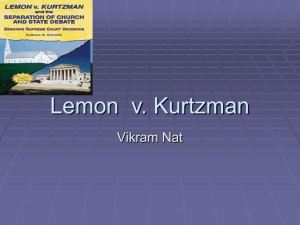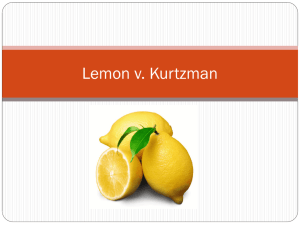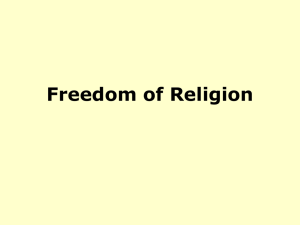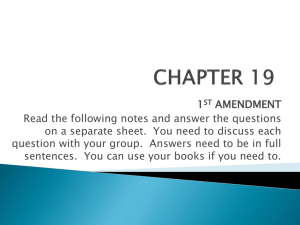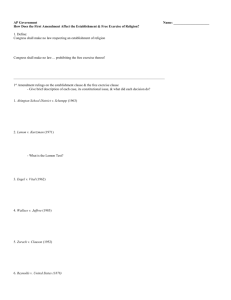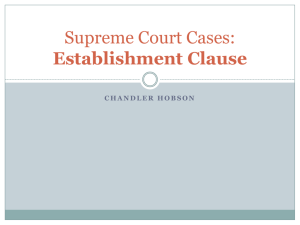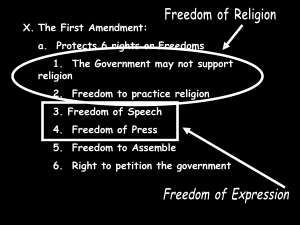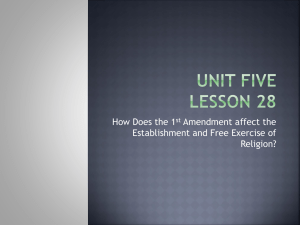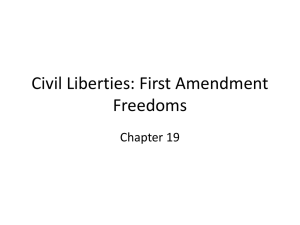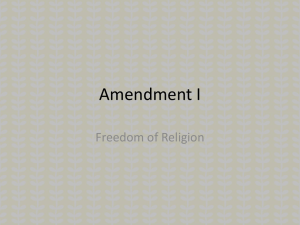The First Amendment - Methacton School District
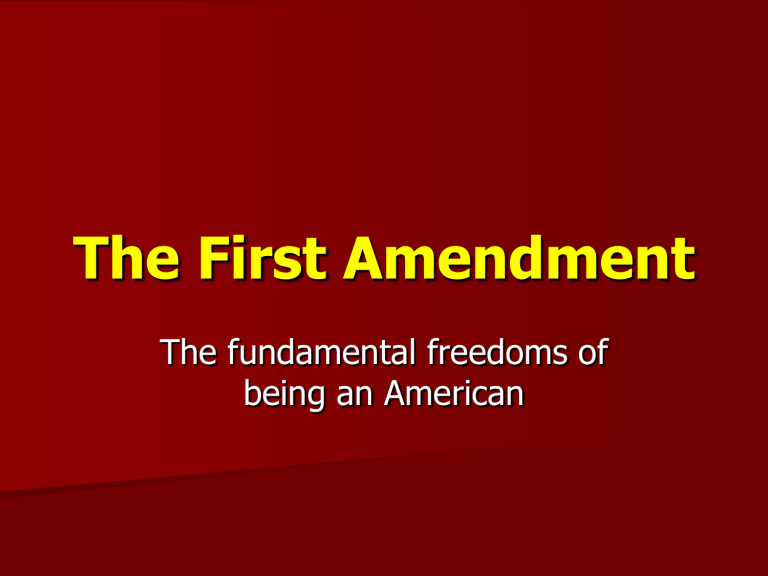
The First Amendment
The fundamental freedoms of being an American
5 Freedoms of the 1 st
Amendment
Freedom of Speech
Freedom of the Press
Freedom of Religion
Freedom to Petition
Freedom to Assemble
Freedom of Religion
90% of Americans identify themselves with some type of religion.
The establishment clause states that “Congress shall make no law respecting an establishment of religion.”
The free exercise clause
“prohibits government from unduly interfering with the free exercise of religion.”
Do these clauses seem clear to you?
The Establishment Clause
How big of a wall can a government with 90% of its’ population believing in religion separate itself? Can it effectively serve its’ people?
Most gov’t officials take their oaths in the name of God, our coins are imprinted with “In God We
Trust,” the Pledge of Allegiance states that we are “One Nation under God,” amongst other statements.
Even though the establishment clause states that there is a separation of church and state, how big is that separation?
Everson v Board of Education,
1946
Story – Citizens of NJ challenged a law that allowed the state to pay for busing students to parochial schools.
Amendment(s) challenged –
1 st – Establishment clause.
Verdict – The Court ruled that the law was established to benefit the students, not any religion.
Impact – There can be interaction between church and state, it is just restricted.
Ask Yourself This Question?
Can the state interfere with the practice of religion?
Is gay marriage an infringement on the separation of church and state?
Lemon v Kurtzman, 1971
Story – PA and RI began giving monies to Parochial schools for teachers salaries, secular textbooks, and secular learning materials.
Alton Lemon, a PA taxpayer, sued the school superintedent because public monies should not be used in religious institutions.
Amendment(s) challenged – 1 st
Verdict – The court ruled that giving monies to parochial schools violates the establishment clause.
Impact – The court created The
Lemon Test to guide future 1 st amendment religious decisions.
What is the Lemon Test?
The purpose of the Lemon Test is to determine if a law is made that basically establishes religion by the government.
What are the critieria?
#1 – The state must make a law that has a secular legislative purpose.
#2 - The law must not either advance or inhibit religion of any kind.
#3 – The law must not create “an excessive interaction with religion.”
Should the government interfere in situations involving religion or are they stepping on citizens toes?
When is too much government too much?
Prayer in schools?
In Engel v Vitale, 1962, the court ruled that school prayer, even if it is a nondenominational prayer, cannot be allowed.
In Abington School District v Schempp,
1963, the court banned schoolsponsored Bible reading and prayer in the schools that are led by teachers, because public taxes pay teachers salaries.
However, the Equal Access Act passed in 1984 allowed students to have religiously centered meetings in the school.
Other State v Religion Issues
In Epperson v Arkansas, teaching evolution v creation was challenged.
Courts ruled the city of
Pawtucket, RI could only display a Nativity scene if it was accompanied by other Christmas displays, such as a tree, Santa, or reindeer.
In the County of
Allegheny v ACLU, a tree had to accompany the displaying of a menorah.
The Free Exercise Clause
While the court has ruled that everyone has the right to religious beliefs, everyone is not entitled to practice those beliefs however they want to.
When does practicing a religion infringe on the rights of citizens? Can religions be dangerous?
Can religions cause harm to others? Can religions ask you to commit crimes?
Exceptions to the Free Exercise
Clause
In Reynolds v U.S., the court ruled that the Mormon religion cannot justify the practice of polygamy.
In Oregon v Smith, your religion cannot justify the use of illegal substances as part of a religious ceremony.
In Wisconsin v Yoder, the court ruled that the state could not require Amish people to send their children to school beyond the eighth grade.
To Salute or Not to Salute?
Is it Constitutional to salute the American flag during the Pledge of Allegiance?
In Minersville School District v Gobitis, the court said that it was not acceptable for students to not salute the flag due to religious beliefs because the flag was a patriotic symbol.
This decision would be overruled in WV
State Board of Ed. v Barnette that patriotism could be met without forcing people to compromise their religious beliefs.
